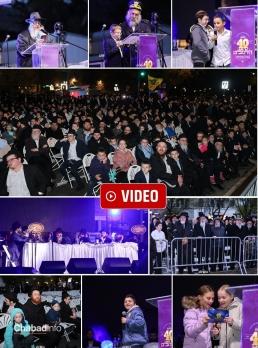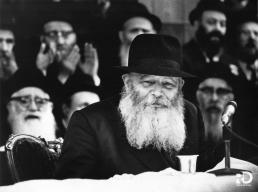Jewish Unity vs. Egyptian Unity
During the infamous Beilis blood-libel trial in Kiev in 1913, the prosecution cited a passage of Talmud to “prove” how Judaism is disrespectful of gentile lives: “R. Shimon bar Yochai said: The graves of Gentiles do not defile, for it is written, “And you my flock, the flock of my pastures, are man;” only you are designated ‘man’, and the gentile nations are not titles ‘man’” • Full Article
PrinciplesMagazine.com/Written by Rabbi Levi Liberow
During the infamous Beilis blood-libel trial in Kiev in 1913, the prosecution cited a passage of Talmud to “prove” how Judaism is disrespectful of gentile lives:
“R. Shimon bar Yochai said: The graves of Gentiles do not defile, for it is written, “And you my flock, the flock of my pastures, are man;” only you are designated ‘man’, and the gentile nations are not titles ‘man’.” (Bava Metziah 114b)
Moscow’s chief rabbi, Rabbi Ya’akov Mazaeh, was a professional witness for the defense team, and was required to explain this perplexing Talmudic statement to the tribunal.
Rabbi Mazahe’s fascinating explanation was straight and to the point: “If Ivan in Kiev is accused of murdering Stephan, not every Kiev citizen is held to blame; if George in London is accused of robbing a bank not every Englishmen is put to trial; but when Mendel Beilis, a Jewish man, is accused of murder, not only he is put to trial, but his fellow people in the entire country, the sacred Jewish texts and all Jews around the world must also face the tribunal.”
“This,” Rabbi Mazaeh emphatically continued with his polished Russian rhetorical abilities, “is what the Talmud means: only you, the people of Israel, are regarded as a ‘man’ – one man, a nation that the pain and deeds of one member of it effect and are felt by all his fellow Jews!”
[R]osh Chodesh Sivan is when the Jewish people camped in the Sinai dessert. The Torah uses the term “He camped before the mountain,” instead of the plural version of the word “They camped” which would be grammatically more proper when describing the camping of an entire nation of three million strong.
Earlier, when the Torah relates the chase of Pharaoh and the Egyptians after the recently released Jews to reclaim their precious slave labor, the Torah makes a similar change: “Israel lifted their eyes and behold was Egypt, he was traveling after them,” not “they were traveling after them.” [Some adjustments were made to the translation to conform to the Hebrew original, a grammatical English translation wouldn’t distinct between plural and singular in this context.]
To Rashi, the classical basic commentary of the Torah, this ungrammatical wording doesn’t go unnoticed. He offers the identical explanation to both verses: “they were like one man with one heart” in the common goal and pursuit each respective nation was sharing.
An identical interpretation with one difference: the Egyptians were chasing the Jews “with one heart like one man,” the Jews camped before the mountain “like one man with one heart.”
Both the Egyptians and the Jews stood in unity yet they practiced a different type of unity.
The Egyptians shared a common goal, “one heart”: deep hatred to their Jewish slaves and an unwillingness to let them be free, a common desire and “oneness of heart” which led them to unite and act as “one man” to form an army to recapture them. Their unity wasn’t an intrinsic one; it was a technical superficial unity.
There is another form of unity, a real organic unity which actually thrives on differences, like a one body which consist of many organs, but they still feel one another and use their individualism to offer help to the other in need, like a healthy hand which will bandage a wounded leg.
Here, unity isn’t a goal to be reached; unity is a description of a reality that either exists or doesn’t. Unity isn’t that many conform to one model, unity is when individuals discover that their individuality isn’t a contradiction to their unity, it’s a way to enhance an existing unity and shared destiny. Individualism within unity is the many angles of a cut diamond that make its inherent beauty shine.
Moshe received the Torah differently than Aharon, and both of them had a deeper perception of it than Aharon’s sons. Aharon’s sons had a deeper perception of it than the seventy elders who were still many levels higher than the simple Jew in the edge of the camp. To say that all the Jews had “one heart” in their desire and readiness for the Torah would be an incorrect statement. But they all were “one man,” they were united in the quest to receive the Torah. When their unity called for a shared goal they all put their differences aside and prepared in one way to receive the Torah, the very same Torah which afterwards they worked individually to perceive.
***
Jewish unity exists. The message of Rosh Chodesh Sivan is that we must let the “one man” form “one heart” and not to do so when only we face tragedy, but also when we prepare to make giant leaps as a nation, like receiving the Torah, or greeting Moshiach which will introduce a “new” and deeper understanding of the “old” Torah.
Moshiach in Chasidic thought is the leader who possesses the soul of the leader of the generation, the “Nasi Hador.” The Nasi Hador possesses a “neshama klalit” – a “general soul” which is the core of Jewish unity. This special soul, in terms we can relate to, is the ability to see the immense potential in every Jewish man or women, young or old and to empower him or her to “do all that he can” to bring about the revelation of Moshiach – a time in which the “one heart” will be visible only due to happy and joyous circumstances.
339
Join ChabadInfo's News Roundup and alerts for the HOTTEST Chabad news and updates!










































